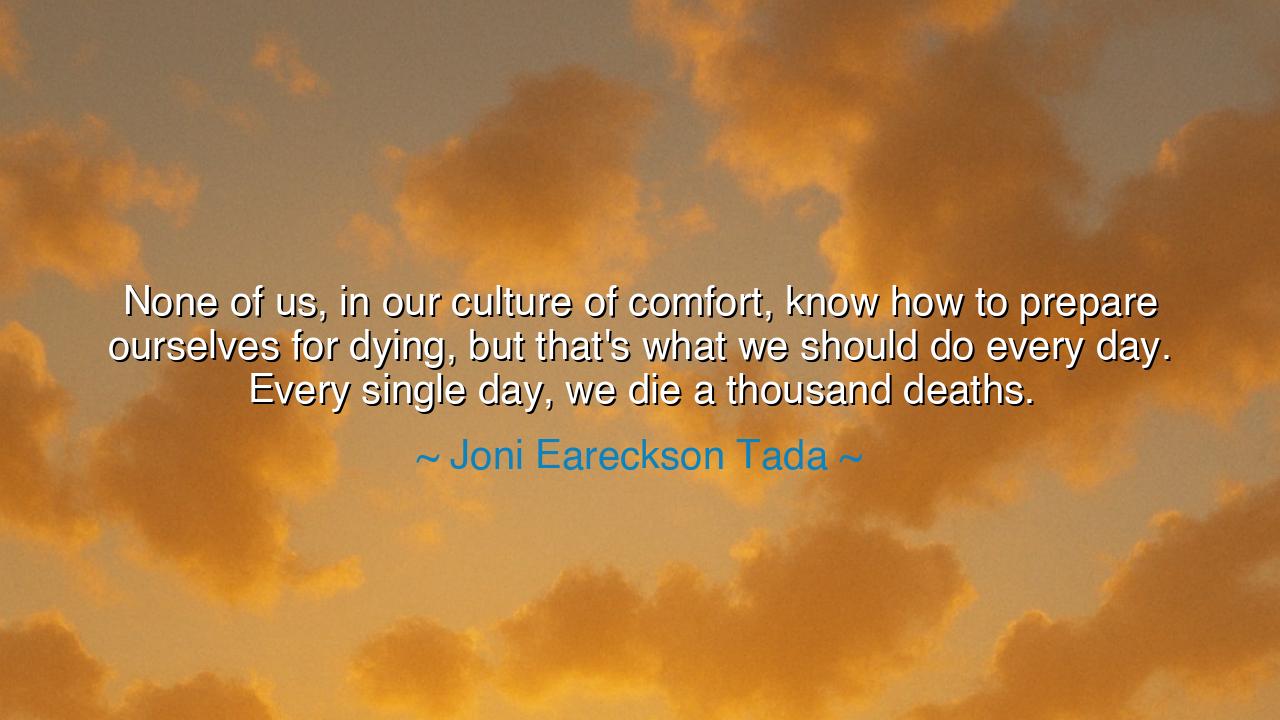
None of us, in our culture of comfort, know how to prepare
None of us, in our culture of comfort, know how to prepare ourselves for dying, but that's what we should do every day. Every single day, we die a thousand deaths.






The words of Joni Eareckson Tada, “None of us, in our culture of comfort, know how to prepare ourselves for dying, but that's what we should do every day. Every single day, we die a thousand deaths,” speak from the deep well of lived suffering and hard-earned faith. In these words, she reminds humanity of a truth the ancients knew well but modern hearts have forgotten — that death is not only an event at the end of life, but a discipline of the soul practiced in life. Her message is not one of despair, but of awakening: that to truly live, one must learn to let go, to surrender pride, pleasure, and fear, and to die daily to the illusions that bind the spirit to the material world.
Joni Eareckson Tada’s own story gives the quote its radiant weight. Paralyzed from the neck down after a diving accident at the age of seventeen, she faced the death of the life she had known — the death of dreams, movement, and freedom. But in that darkness, she discovered that the art of dying to self was also the path to transformation. From her suffering came strength, from her stillness came purpose, and from her loss came a voice that has comforted millions. Her reflection arises not from theory, but from experience — the recognition that each day asks us to die a little to comfort, ego, and attachment, so that something eternal can awaken within us.
To the ancients, such wisdom was sacred. The Stoics taught the daily practice of memento mori — “remember you will die.” They did not meditate on death to court misery, but to cultivate peace. For the one who lives in awareness of mortality is no longer enslaved by fear or excess. Similarly, the Christian mystics, from St. Paul to St. Teresa of Ávila, spoke of the daily dying of the soul — the death of pride, the surrender of control, the relinquishing of false gods. In every small act of humility, in every sacrifice of selfish desire, they believed the soul drew closer to God and prepared itself for the great passage that all must take.
“Every single day, we die a thousand deaths,” Joni says — and indeed, she speaks of the countless endings that shape a human life. We die to youth, to illusion, to our need for approval. We die when we forgive instead of retaliate, when we let go of the past, when we choose faith over fear. Each of these deaths is a shedding of skin, a quiet surrender that makes room for renewal. Just as the seed must fall into the earth and die before it can bloom, so must the human soul continually yield what is transient to make space for what is eternal. In this way, death — rather than being an enemy — becomes a teacher, guiding us toward spiritual maturity and freedom.
History offers many mirrors for this truth. Consider Nelson Mandela, who endured twenty-seven years in prison. Each day behind bars was a kind of death — the death of freedom, the death of dreams deferred. Yet he accepted those losses, learned from them, and emerged not hardened, but transformed. When asked how he endured, he said, “I have walked that long road to freedom… I dare not linger.” Mandela’s life embodied Tada’s teaching: to prepare for death is to live with the understanding that nothing external can enslave the spirit that has already learned to let go. The soul that practices dying daily becomes unbreakable.
But in our culture of comfort, as Joni laments, this wisdom has been lost. We surround ourselves with distractions, shielding ourselves from discomfort, believing that security is life’s highest good. Yet comfort breeds fragility. When pain comes — as it inevitably will — we are shattered, because we have never trained the soul to stand firm. True preparation for death means learning to face loss without losing ourselves, to suffer without bitterness, and to hope even when every earthly promise is stripped away. This is the quiet heroism that Tada calls us to — not to escape pain, but to meet it with faith and surrender.
So, my listener, take this lesson to heart: practice dying every day — not by courting sorrow, but by loosening your grip on what cannot last. Let go of resentment, pride, and fear. Learn to be content in discomfort, patient in trial, and grateful even in loss. For every small death you embrace willingly will prepare you for the great one that none can escape. And when that day comes, you will not tremble, for you will already have died a thousand times and found, in each dying, a deeper life.
For as Joni Eareckson Tada teaches, death is not merely the end of the body, but the unveiling of the soul. And those who have practiced dying daily — those who have surrendered their ego, their attachments, and their fear — will find that when death finally comes, it has no power left to take anything away. They will have already given all — and in giving all, they will have gained eternity.






AAdministratorAdministrator
Welcome, honored guests. Please leave a comment, we will respond soon